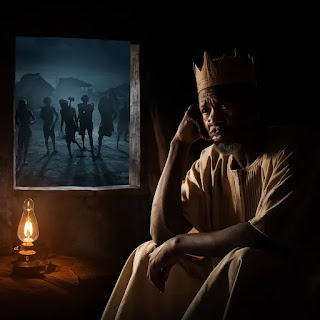The Rot Begins at the Top: A King's Dillema
By Sunday Ajibola
Oba Atunluse woke just after midnight. The last two hours of sleep had been more of a nightmare than rest. These were troubled times—both for his community and for him personally. He replayed in his mind the ugly events of the last few days; no, the past months. The issues had been simmering for a while. Since last week, the people had begun running out of patience with him. The abnormal situation was becoming unbearable. His people could no longer keep their feelings to themselves. For the first time since he ascended the throne many years ago, they told him to his face, "Kabiyesi, you are our king, our ruler. You must find a solution to this menace. These times are not normal for us. We cannot tolerate these strange happenings anymore."
King Atunluse knew trouble was looming.
His village, Abule Iwa, had become a haven for criminals—thieves and robbers. They had started by stealing chickens and goats, but now they had escalated to attacking people in their homes with handmade weapons and dispossessing them of their possessions. No home was spared. The thieves had grown bold.
The monarch's fears were heightened due to the failure of past measures to nip the problem in the bud. All the meetings held by the Baale-in-Council on the matter had yielded no results. Sleep would not come. He was too preoccupied to allow his mind to rest. Eventually, he came up with a revolutionary yet all-encompassing solution.
The following morning, he summoned the Baale-in-Council to an emergency meeting. He dispensed with the unnecessary formalities. After the chiefs had paid their homage, he went straight to the point.
"My people, you are the closest to me. We are all aware of the situation at hand, and our people are beginning to see us—particularly the throne—as incompetent leaders. If we do not find a solution to these criminals’ activities, it will consume us. I have given the issue deep thought overnight and have come up with a solution that I believe will solve the problem."
Oba Atunluse announced that, henceforth, anyone caught by the guards would be beheaded in the town square before the people. The chiefs applauded the initiative, praising it as a novel, problem-solving measure that would serve as a deterrent to other criminals and those with criminal inclinations.
The following morning, the people were summoned to the village square, and the new law was announced. It was greeted with applause. Surprisingly, however, a few dismissed the effectiveness of the measure. On their way home, they voiced their concerns, saying, "These criminals are not ghosts. They live among us. If the leaders want to catch them, they have the men and means to do so. Let’s keep our fingers crossed and see how far this new law goes."
The guards were given the power and authority to arrest anyone caught engaging in criminal activities.
A week later, they arrested a young man in the night after he had robbed some people. He was wearing a mask. When the veil was removed, the guards were shocked to see the face behind it. They debated among themselves. "We’d better let this man go. Who will tell the executors of the law that we caught such an important person in town stealing?" The man was held in prison.
At daybreak, they went to inform the king’s second-in-command about whom they had apprehended. He was shocked and shouted, "Eewo! The heir to the throne, a criminal? I’m not the only one who should hear this." The other chiefs were informed, and they unanimously agreed to tell Oba Atunluse about their discovery.
Upon being told whom the long arm of the law had caught, the king smiled—a wry smile. He said, "Why have you come to tell me this? I am not the law. Anyone who breaks the law must face the consequences. A criminal is a criminal, regardless of their background or family. Go and carry out the beheading."
That very day, at exactly 1 p.m., Prince Adekanmi was beheaded before the entire community.
And, that execution was the last time a case of stealing and robbery occurred in the village.
Fish rots from the head. Let no one deceive you into thinking that "we, the people" are the government. When a society becomes a breeding ground for underdevelopment, criminality, and the looting of public funds, hold the leaders responsible, not the followers. Those blaming the followers for societal ills are merely being diversionary.
- Get link
- X
- Other Apps
- Get link
- X
- Other Apps

Comments
Post a Comment